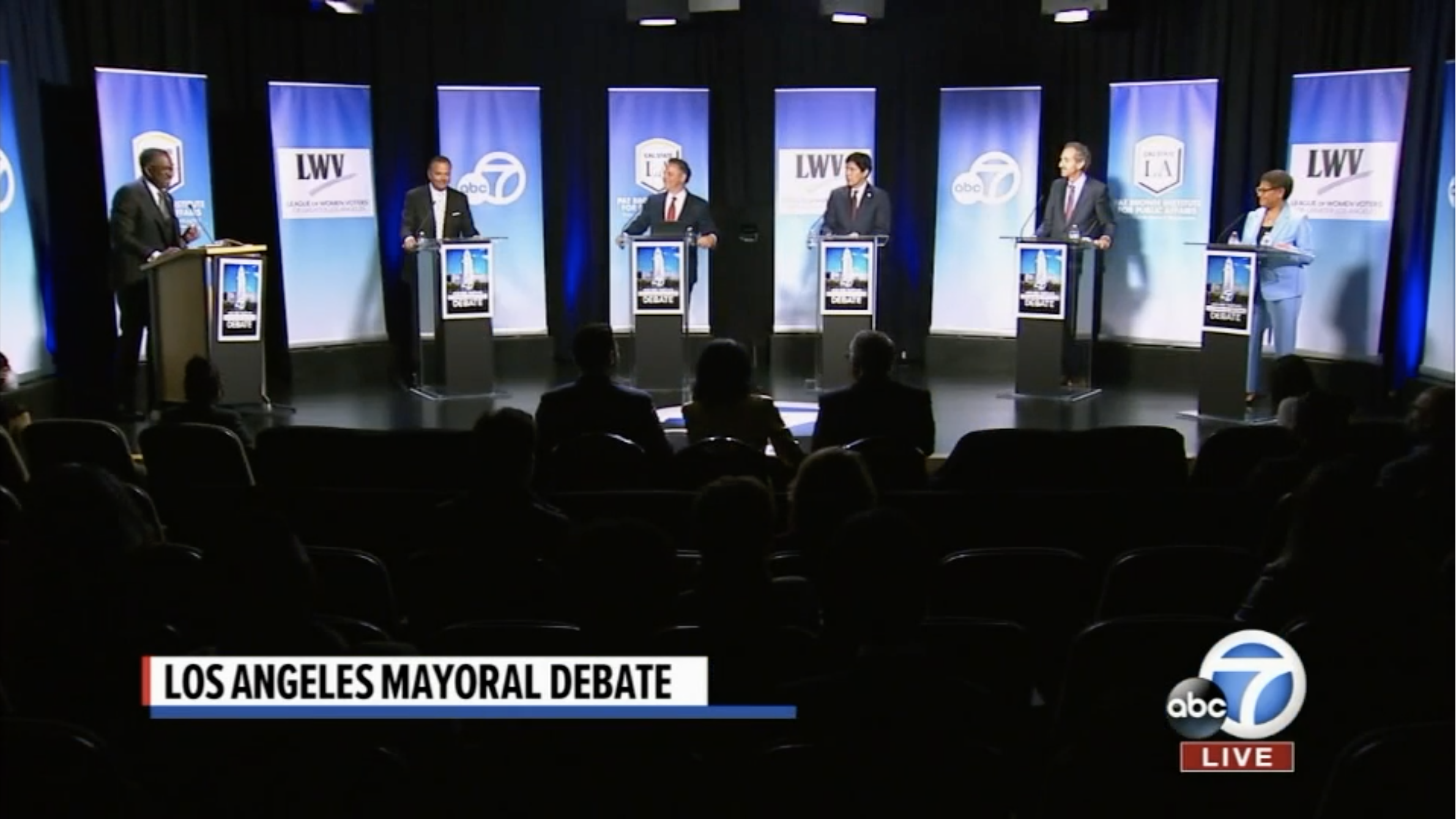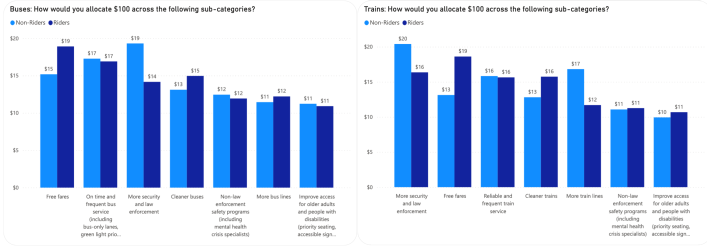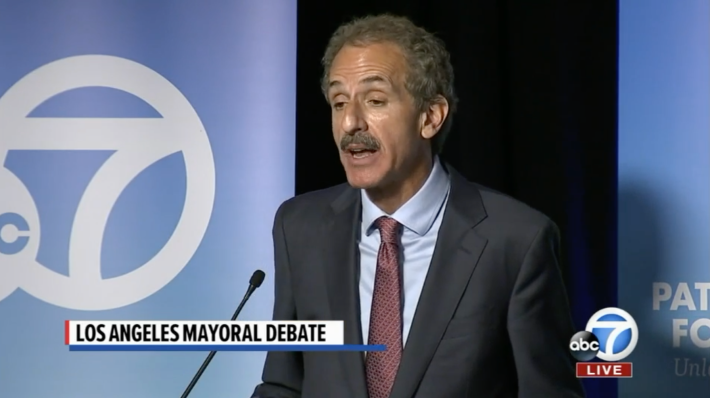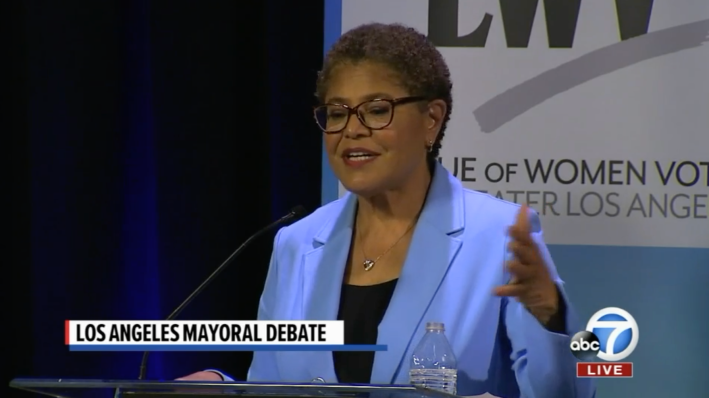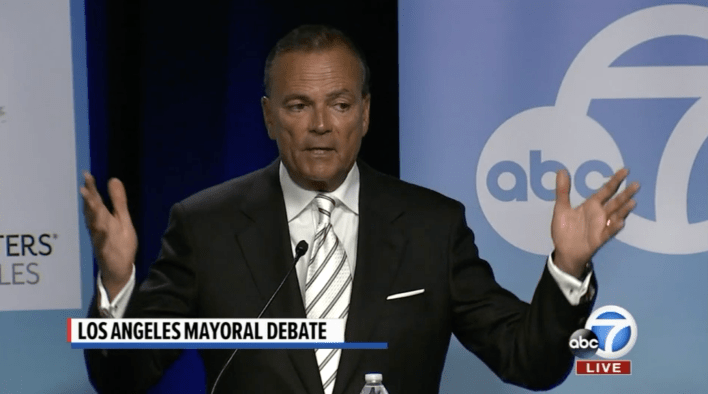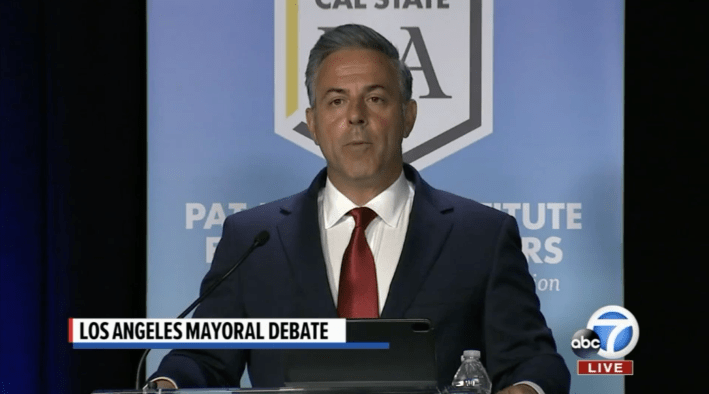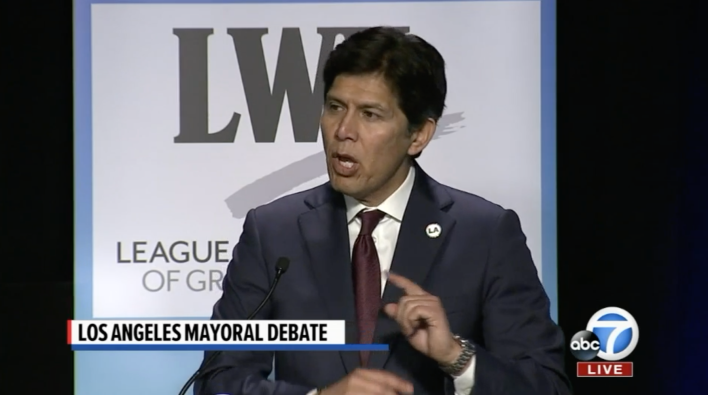This past Sunday night, congressmember Karen Bass, city councilmembers Joe Buscaino and Kevin de León, City Attorney Mike Feuer, and billionaire developer Rick Caruso squared off in a debate moderated by ABC7's Marc Brown at Cal State L.A.
The debate, hosted by the Pat Brown Institute for Public Affairs and the League of Women Voters of Greater Los Angeles, was marked by controversy even before it kicked off. Candidates who were not invited to participate, including Gina Viola, who was excluded despite polling higher than Buscaino's one percent, protested outside. And Black Lives Matter-Los Angeles leader Professor Melina Abdullah was forcefully dragged out of the auditorium just as the event was getting underway.
Coming on the heels of the 30th anniversary of the uprising sparked by the acquittal of the officers who savagely beat Rodney King, it was a little surprising that the topics tackled weren't better grounded in questions having to do with race, the state of Black and brown L.A., and what it takes to create a more equitable city. When questions did touch on those issues, the framing was often very poor. Univisión's Gabriela Teissier asked about environmental justice and developments causing displacement and gentrification in disinvested communities, for example, but unfortunately muddled both of those important issues into a single unanswerable question. Candidates' responses were subsequently all over the place, most notably Caruso's; he whiffed completely and said it was important to celebrate diversity but that it was also difficult for people dream big while crime remained a problem and there were encampments in front of businesses.
Teissier's other questions were even more bizarre, including one premised on the idea that "we all agree" that disrespect of authority is "obviously" a big issue, and that it is essential that respect for authority be restored in "youth at risk." And in a question about street vendors, she erroneously claimed there was no regulation of street vending before asking candidates whether they would address concerns that there are too many vendors in the streets by further limiting where they could vend. Not to be left out, ABC7's Carlos Granda asked a question implying that unhoused people's reluctance to accept a shelter placement meant they preferred living on the street to having placement in permanent housing. [Much has been written about the very good reasons why people are reluctant to enter shelters.] And his colleague Josh Haskell asked how candidates felt about "broken windows" policing - an approach actively advocated for by Caruso (and former "broken windows" Chief Bill Bratton) in his campaign ads - rather than, say, asking candidates to grapple with how well L.A. has done with regard to police reform.
The candidates' answers to those and other questions can be seen here.
Because Metro tends not to grab headlines unless there is a terrible crime or a Sheriff threatens to defund himself, the focus here is on the transportation question asked about an hour into the debate. Namely: how often candidates rode transit and what they would do to improve the service, make it safer, and boost ridership.
L.A.'s mayor does not control Metro, as Metro serves the entire county. But the mayor sits on its board and appoints three other boardmembers, giving the city an important voting bloc with which to shape the agency's priorities and outcomes.
A lightning round question doesn't give candidates a lot of time to expound upon their plans for Metro. But it does offer a chance to see how well the candidates' priorities line up with the lower-income riders who rely on the system.
In a recent survey on budget priorities, Metro riders (dark blue) said that their highest priorities were free fares, better and more frequent service, and cleaner buses, trains, and stations/stops. While they did prioritize more safety and security in the form of law enforcement, it was not their top concern. [Click the graphs below to enlarge; find the full set of survey results here.]
The candidates, in contrast, were more aligned with non-riders (light blue, above), citing safety and the need to address the increased number of unhoused riders as their first priorities.
Because the candidates' priorities seemed to have been shaped by headlines about crime and perceptions of safety (rather than actual data or firsthand experience), most were not specific about the safety issues they were concerned about. Karen Bass was a notable exception - she referenced recent news about the rise in verbal and physical assaults workers at Union Station report experiencing. So was Kevin de León, in that he quickly brushed past safety quickly to list a number of things he'd like to see to improve the rider experience.
For the record, none mentioned concerns about the disproportionate ticketing and arrest of Black riders that have been at the center of recent discussions within Metro about how to reimagine public safety on the system. And none referenced the shifts toward alternatives that are currently underway.
Their brief remarks are transcribed in full below.
Mike Feuer
- Last time he rode: not a transit user, but daughter likes the Expo Line
- Key concern: investing in safety via uniformed officers and mental health workers
"[Transit is a] huge question. I wrote the law that authorized Measure R which dramatically expands $35 billion for public transit. At the moment, as city attorney, because I have security, I rely on that security to get me back and forth. But I've ridden Metro many times. My daughter rides the Expo Line all the time. What do we need? We need to have more safety and security to get people back after the pandemic on those lines. We do it by having more officers and non-uniformed mental health experts on those lines. We do it by making it cleaner to be on Metro. We cannot succeed as a society here unless we can make that investment that we take in public transit and allow people to feel comfortable on it again."
Karen Bass
- Last time she rode: a year ago
- Key concern: investing in safety via uniformed officers and mental health workers, investing in protecting transit workers, and investing in the services and housing people turning to the trains for refuge need
"I think that what we need to do to increase ridership is we need to make sure that it is safe. That's number one. And one of the ways to do that is, in addition to having law enforcement there, we also need to have counselors there that deal with mental illness, that deal with substance abuse. There was just an article in the paper the other day about how people that work at Union Station no longer feel safe because of the homeless situation that's there. We need to deal with that. We need to make sure that those [unhoused] people can have housing and services so that they don't have to ride the train 24 hours a day."
Rick Caruso
- Last time he rode: pre-Covid, somewhere in the vicinity of USC
- Key concern: an enormous amount of unspecified proposals and criminals lurking underground
"Let me tell you, I think we've got a massive problem with the infrastructure on mass transportation in the city. I think we have failed the city on how we put in our infrastructure and I think it's a shame. We need to be doing a better job. We've invested tens of billions of dollars. We have an enormous amount of proposals of doing things that, in my opinion, don't make sense and I wouldn't allow to happen if I was mayor. We could spend our money in a much better way getting people out of their cars and onto public transportation by making it a better experience than putting them in the ground with not a lot of safety precautions down there, in terms of criminals."
Joe Buscaino
- Last time he rode: didn't because it takes too damn long
- Key concern: an officer at every stop (minus bus stops, probably, given that there are around 8,000; so too bad for you, bus riders)
"Like many Angelenos, the public transportation system...I haven't taken it in a long time because it takes too damn long to get from San Pedro to downtown Los Angeles. It's faster if I actually go into the car and use my car. But public transportation is worthless when it's not safe, and I'm hearing this from all corners of the city of Los Angeles. And my plan is, in my increase of the LAPD, we will have a uniformed presence at all of the Metro stops. Because I can tell you, based on my experience as a police officer, when you have uniformed presence and uniformed personnel, you'll see a reduction in crime."
Kevin de León
- Last time he rode: rode everywhere with mom
- Key concern: homelessness, clean and safe transit, faster buses, free fares for some, Light Rail Everywhere All At Once
"I rode the bus with my mother all the time, and I rode that bus with my mother everywhere. And we need clean, and we need safe public transportation. And we need to deal with the homelessness crisis. So we need to provide the housing that's necessary so they [the unhoused] don't ride the bus or the Metro every single day. We need dedicated bus lines. We need to make sure that we have light rail that's ubiquitous throughout the city, but that is above grade so it moves people faster around the city, around the county. We also need to make fares free to all young people to all students, and to all senior citizens."
Watch the full debate on ABC7's website here.
